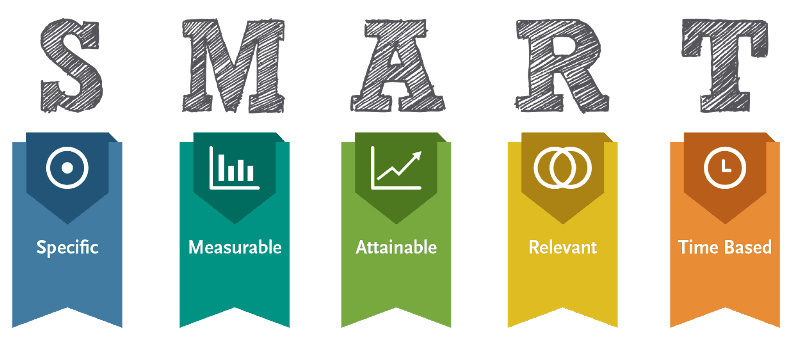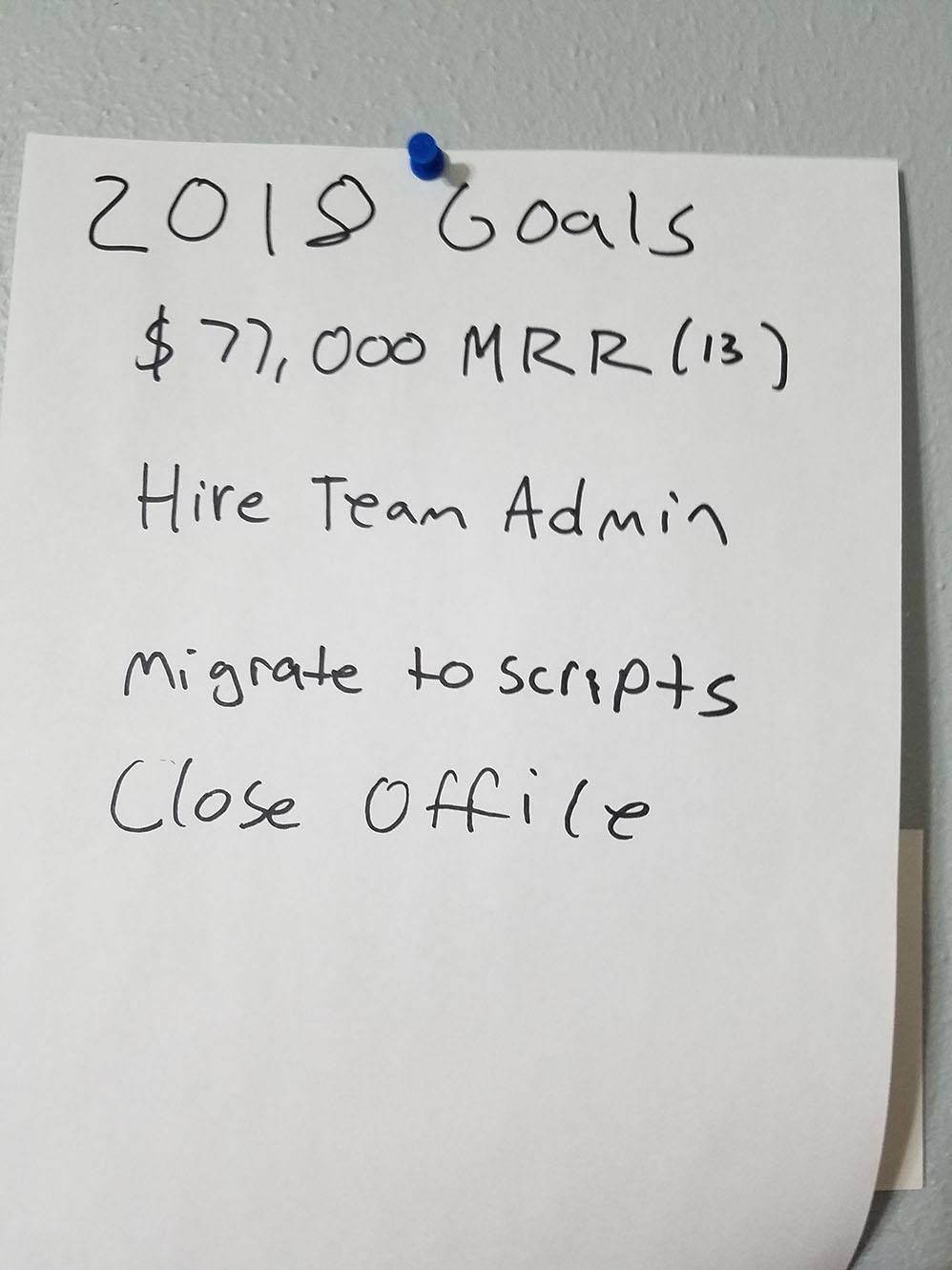Most small business owners take time at the beginning of a new calendar year to think about where they’d like to see the business go during the next twelve months. It’s important to have broad annual goals to give the business direction and for it to achieve its highest potential. Annual business goals help small business owners navigate the next year, allow for checkpoints in successes, and help track performance.
Have you already started considering the goals you’d like for your small business to achieve in 2018 or are you too stuck in the minutia of it all? Concrete goals and systems point you in the direction you need to go.
Achieving Goals Starts with Setting SMART Goals
Start off by Making ’em Lofty
“If you set your goals ridiculously high and it’s a failure, you will still fail above everyone else’s successes” – James Cameron
You should reach for the stars when it comes to your long-term goals. What do you envision for the future of your business? Would you like your tech startup to be bought out by a corporation and retire early? Do you want to be able to pass your small business on to your family for generations to come? Think about what your ultimate goal would be. At this point, t doesn’t necessarily need to be realistic. In initial goal setting, you should think big and consider what the best case scenario would be if there were no obstacles.
Get it down on paper, too. Don’t just keep ideas in your head. Write a list of goals that you would like to have achieved in one, five or ten years. Get it all out. Don’t worry about how you’ll get there yet. Just take this moment to think big. If you’re not the wordy type, you can get your goals on paper by using a vision board.
What’s a vision board?
Vision boards are visualizations of your goals. Think of collages of your yesteryear, but this one has a purpose. Go through mementos of your own and periodical publications like magazines to cut out visual representations of what you’d like to see your business achieve long term. You can include images, words, phrases, even natural objects.
Visualization is powerful. Olympic athletes have been using visualization for decades to aid them in competing to achieve great physical accomplishments. It may sound hokey, but don’t knock what works.
Next, Reign them In
Now that you’ve dreamed up what your greatest goal would be, you may see one of two things. Either your biggest goal is out of this world, or it’s closer than you thought. Start thinking about smaller versions of what it is you’re shooting for. If you want to be a million dollar company, what would that growth look like? What are the actions you need to take, the people you need to meet? Think about the small businesses that have achieved the goals you’re pursuing. How did they go about that? What’s remarkable about their company? You may need to do some investigative work.
Then, the SMART Part Comes In
If you’ve worked in corporate before, there’s no doubt you’ve heard about SMART goals. In case you haven’t, SMART breaks down like this:
S is for Specific.
This means being very concrete in what you would like to achieve. No unclear language like “make a lot of money” or “improve project management skills” will do. You’ll need to think about the who, what, where, why and which for these items. Goals go stagnant when you don’t clarify things. So decide: Who will be involved? What do I want accomplished? Where will it be done? Why am I doing this–what’s the purpose, the underlying reasoning? Which constraints am I likely to come across?
M is for Measurable
Your goal should be quantifiable so that you can track your progress. What numbers will show you that your goal is accomplished?
A is for Action-oriented (or attainable, assigned, achievable or agreed upon. Depends who you ask.)
Lay out the actions that need to be taken and by whom. You should be able to assign individual tasks to people on your team who can take ownership of that step along the way.
R is for Relevant and Ralistic
You’ve already figured out what your loftiest of goals would be. Now is the time to take into consideration what is realistic and in line with the resources you currently have.
T is for Timely
Your goal should include a time limit. If you just leave it up to the stars when you hope for this item to be completed, you won’t have the sense of urgency required to complete what needs to get done. Having a set time limit, with an exact date that the objective is expected to be completed, will help with your overall time management of completing it.
Goals Aren’t Enough
It may sound kind of funny on a post about goal setting but goals are nothing without a plan. Or, as Scott Adams of Dilbert fame puts it: “Losers have goals. Winners have systems.” Yikes. That comes off a bit harsh, but you don’t sell comics by dancing around an opinion, either.
Pick your Systems
Adams suggests looking at systems as asking yourself, “What persistent skills or relationships can I develop?” rather than short term goal setting. Systems increase the consistency of the work that you put out, which, in effect, increases the quality. If your systems involve relationships with other people, your’e increasing the amount of people who have been exposed to your work consistently. We all know that selling a good product or service can often feel like a numbers game.
He goes into detail about how systems work in his book, How to Fail at Almost Everything and Still Win Big: Kind of the Story of my Life.
Start small
When you’re looking at the systems that you want to put in place to achieve a great goal, you should start with the smallest actions that can get you on the path toward transformation. Trying to do everything at once causes burnout. Or, as Confucious put it,
“The man that chases two rabbits, catches neither.”
So to achieve something great, start making actions that are extremely small and then make them into habits. Add on to your habits over time rather than trying to do it all at once. Why? When the average person looks at a huge goal that needs to be undertaken, they’ll generally get overwhelmed. Starting small in your actions works because unfortunately not a lot of action takes place when you’re overwhelmed. Seth Godin, one of the biggest names in marketing and bestselling author, puts a huge emphasis on starting small.
Don’t look for time, schedule time
“I’ll try and find the time.” – the guy that doesn’t end up doing something
When you ‘try and find time,’ you don’t end up uncovering what you’re seeking. Finding time is hard, your schedule is likely full of tasks that are already crucial to the undertaking of business as usual. But if you’re dealing with business matters like filing paperwork, finding good employees, training those employees, and answering too many phone calls, you aren’t likely to have space to achieve those lofty goals.
We recommend scheduling time for these small steps and systems that will help you achieve your long term goals. Mark it on your calendar just as you would an in-office meeting or a call with a client, and stick to it. Because keeping your goal in the back of your mind without making consistent actions toward it won’t get you all that far.
Plan for Obstacles
Consider setbacks that may occur in pursuit of your small business’ goals and plan for the adjustments that will need to take place as a result. Setbacks are a part of any pursuit. You should keep in mind that what you’re seeking to achieve won’t always be easy, so that when there is an obstacle, it will not defeat you.
Help Others
“The best way to become a billionaire is to help a billion people.” – Peter Diamandis
Don’t be too focused on your goals for the business to notice the way that those around you can be served. Think about the goals for your best employees and ways in which you can foster the growth of their career. Think of ways that you can support other small business owners that you know and mentor those who are starting out. Those who focus too much on self-serving ultimately miss out on opportunities that would have aided them in achieving that goal.
So take a moment from your hyperfocused goal achievements to see where you can be of service to others. Provide the support so that they can be good. Discover ways to promote other people’s work. Find outlets for collaboration. Eliminate distractions that hinder their progress. Do the extra work to help others along the way and you’ll be surprised how they’ll return those gifts.
Why is it that People who set Goals are More Successful?
People who set out to achieve long-term goals are more likely to succeed. Why is this? Goals set you on the right path. You’re on the right track even if you don’t reach your highest hopes. Check out this infographic on why goals matter:
What about Those who Don’t set Goals?
The consequences of not having goals in place are many. When you don’t have direction in place many negative outcomes can follow.
- Go with the flow. This sounds really great if you’re spending a weekend at the beach but it shouldn’t sum up your life or your business plan. You’re more likely to get wrapped up in all sorts of things that are lower priority f you’re not the one creating direction in your life.
- Wait, what priorities? Those who don’t have goals set haven’t outlined their priorities. They don’t know what actionable step is most beneficial to their business, and can easily get stuck in a rut, procrastinate, or become stagnant.
- Results are slow. Being without a goal isn’t good if you want to see change occur. You have to be making moves to see results.
- Lack of confidence. Goal attainment is really good for your ego and achieving little wins really builds you up. It shows you that you’re capable. The likelihood you’ll have the confidence to do big things is smaller if you’re not achieving things on the regular.
Check out some more consequences of not setting goals.
Our Goals for 2018
We got much closer to achieving our long-term goals in 2017 and we know that 2018 is looking bright. We came across a big setback with a natural disaster occurring locally but we still managed to keep our goal in sight. This year we have our goals posted for everyone to see. We of course have financial goals, but also we’d like to hire a competent middle manager that suits our business well, change some of our technology, and have all of our employees work from home by the end of the year.
Apply this to your small business
Don’t get too caught up in the minutia of business-as-usual and miss out on same-business-but-better. Place concrete goals in place with smaller sub-goals, make them clear to your staff, and start working toward a more successful business plan.
Now, try this…
- Dream big. Make lofty goals to start out.
- Visualize the goals.
- Create smaller subset goals that are SMART: specific, measurable, attainable, relevant and timely.
- Share the goals with your team and assign aspects to the appropriate team members.
- Create systems and schedule opportunities for goal achievement.
- Help other small business owners along the way.
- Kick those goals out of the park!











Perfect article on how to meet your business goal. Thanks for sharing.